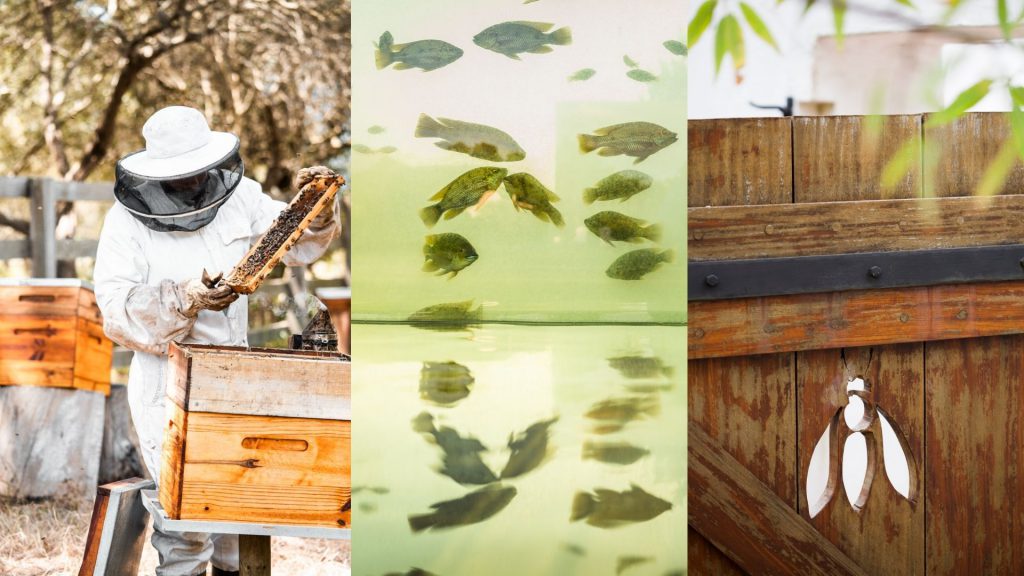
Restaurants
Spa
Day Visits
Shop
Functions
16°C
May 20th, 2022
You’ll spot him strutting around on the farm in a white beekeeper’s suit, guiding guests to peek inside the humming beehives at one of our workshops. Or rushing to remove a tangle of puff adders mating on the dirt road en route to the neighbouring farm. “More for their sake than that of petrified people,” he says. He currently has a deceased spotted eagle owl stored in his freezer. Macabre? Perhaps. But the creature died of natural causes, is entirely intact and, after taxidermy, it will make a beautiful exhibit for us to study and marvel at, he clarifies.
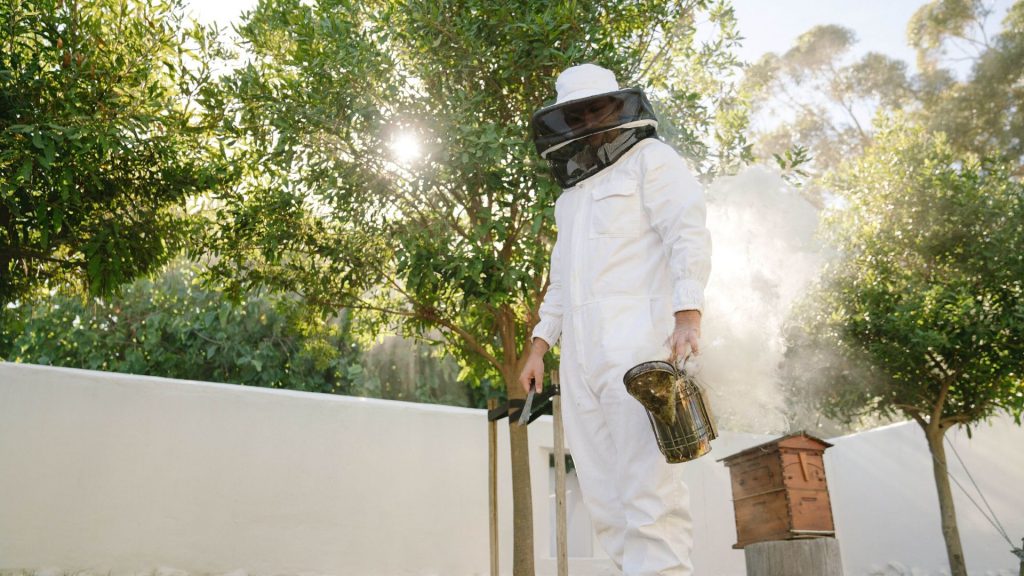
There’s never a dull moment when you’re the resident entomologist on a dynamic, diverse working farm. For Arné Stander, originally a city boy from Bellville in the Western Cape, it’s the occupation of dreams. “I love what I do. Just yesterday, I was hoisted up with a backhoe in my bee suit to remove an invasive wasp nest in a tall tree near the Greenhouse Restaurant,” he says. “I can plan my days, but every now and then something pops up and we have to think outside the box to get the problem solved immediately. Combining my passion with my actual everyday job is so stimulating and motivating. I learn something new every day,” he says.
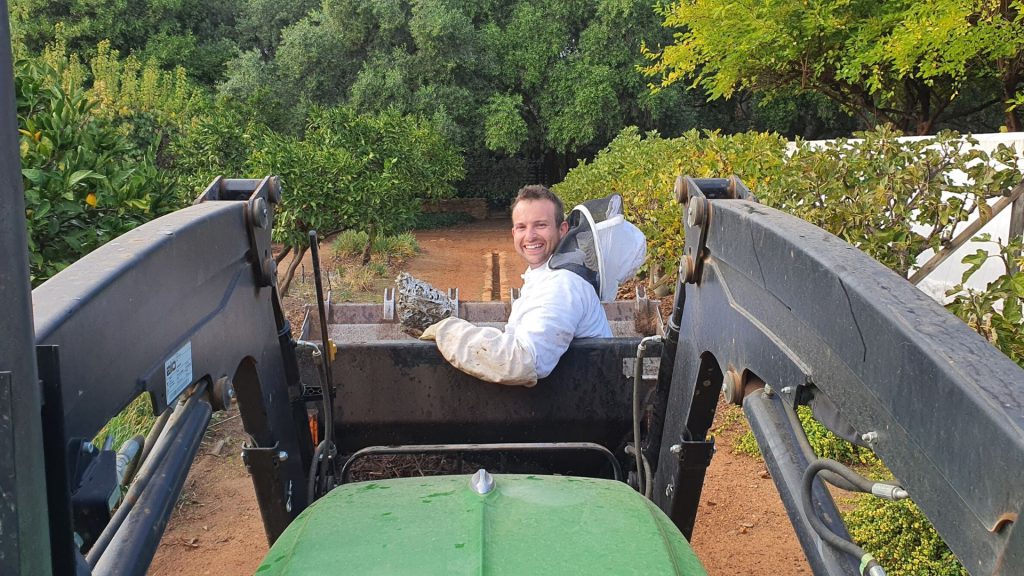
Arné adores creepy crawlies, insects and arthropods. At Babylonstoren, he has the special task of looking after the resident bees, particularly the Western Cape’s darling Cape honeybee (Apis mellifera capensis). He tends to the hives, monitors the bees’ wellbeing and will annihilate any foreign predator who dares threaten these important pollinators’ lives. German wasps (Vespula germanica), in particular.
On another recent witch hunt for the pesky wasps, he dug up a soccer ball-sized underground nest close to the Moestuin. “The German wasps are out to kill the less aggressive Cape honeybees,” Arné says. “The wasps ambush our Cape honeybees at their food source and use their large, powerful mandibles to bite off their heads! I’ve seen a German wasp carrying the entire head and torso of a Cape honeybee back to its nest. If we don’t remove them, they pose a continuous and detrimental threat to our garden’s entire Cape honeybee community as well as other insects.”
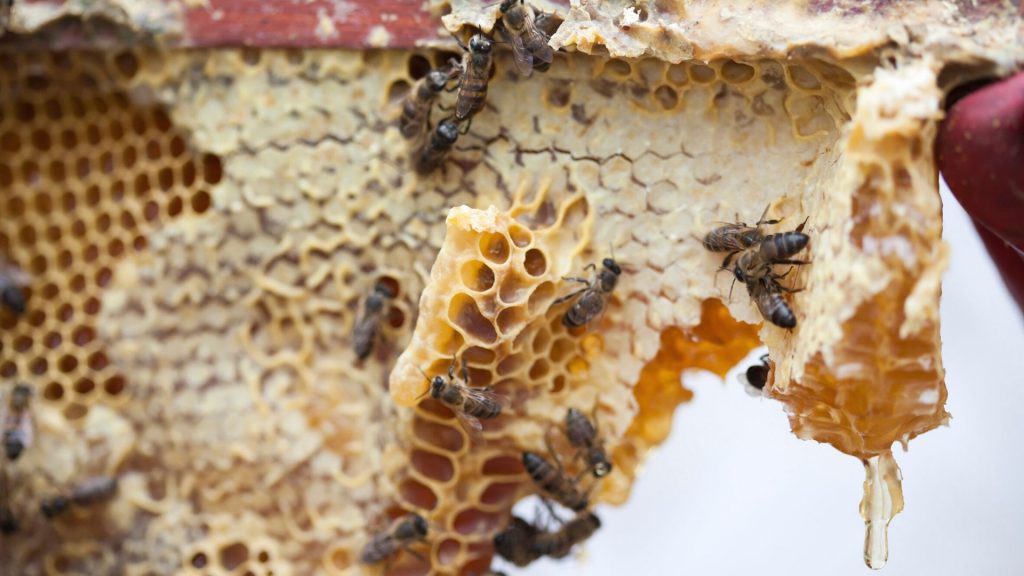
Honeybees play a vital role in the Babylonstoren garden and farm ecosystem by helping to pollinate our fruit orchards, flowers and veggies. Most fruits and are dependent upon bees for pollination and in an elemental sense, bees are responsible for about a third of the food on our daily plates. Without them, we’ll never again know the joy of biting into a freshly picked plum or smearing buttery avocado on toast. Arné is proud to be at the forefront of saving these simple human pleasures, one bee at a time.
A morning stroll with Arné on his weekly bee walk reveals the intricacies of bees’ lives. How a single worker bee will produce only one-twelfth of a teaspoon of honey during its lifetime, for example. Or how the colony works together during hotter months to create a breeze inside the hive by flapping their wings over 200 times per second. “We didn’t invent air-conditioning,” Arné says. “Bees did!”
It makes sense then, when realising the worth of bees, that Arné is ready to run to the rescue of a compromised hive at the drop of a hat, to help return a disturbed colony and its queen to their home or to remove a threatening wasp mob waiting to kill our humble garden pollinators. His grungy bee suit is always on standby on the back of a bakkie or flung over his desk in the garden office – a testament to his dedication.
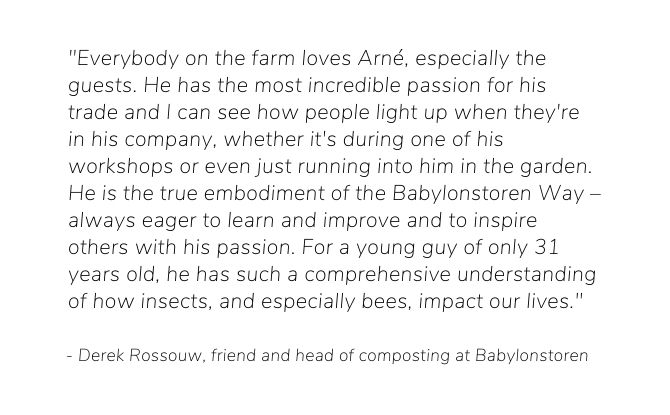
When Arné isn’t rushing to a bee emergency, he’s also in charge of other ecological matters at Babylonstoren. He manages the tilapia fish in the small ponds by the entrance of the garden, as well as the indigenous bokkies on the farm. These include duikers, klipspringers, grey rhebuck (vaalribbok), grysbokkies and springbuck. “We’re currently in the process of acquiring more klipspringers to roam the iconic Babylonstoren hill overlooking the farm,” he says. “These nimble antelope love clambering the rocky outcrops. We haven’t spotted them in a while, so they’re good at hiding in plain sight too!”
Incorporating his work at Babylonstoren, Arné will start his PhD at the University of Stellenbosch in January 2023. His work will investigate the potential facilitation effect of beekeeping on the invasive spread of the German wasp and other invasive social wasps.
